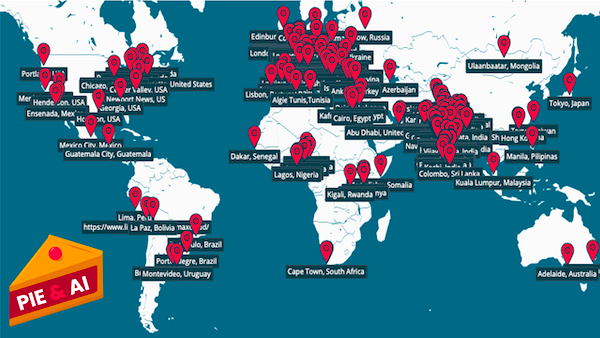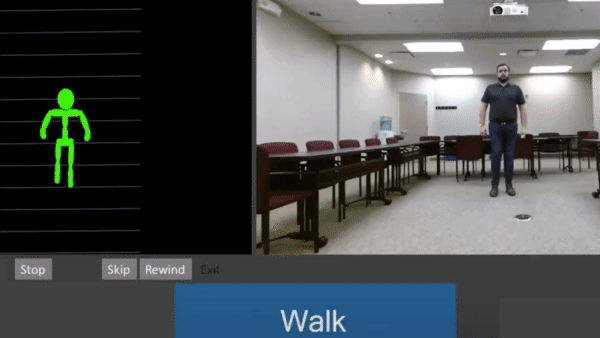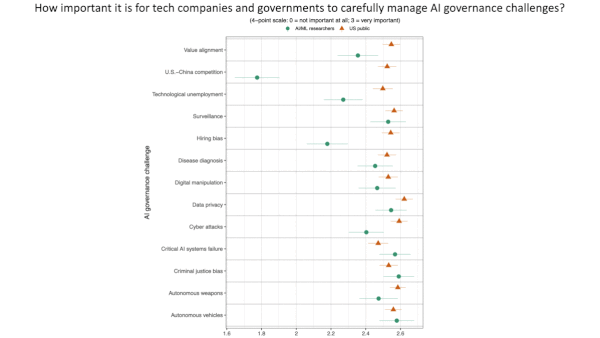Dear friends,
I invite you to be part of Pie & AI, a series of meetups that bring together members of the global AI community for education and conversation. Pie & AI is a place where you can network with peers, learn best practices from industry leaders, get hands-on practice from mentors, and engage in thought-provoking discussions.
I’d like to thank our 200-plus event ambassadors. These extraordinary individuals organize gatherings that connect learners, practitioners, researchers, and special guests. In fact, this week marks the second anniversary of the Pie & AI Ambassador Program, which enables AI practitioners and enthusiasts to host Pie & AI events for their local community. To celebrate this anniversary, DeepLearning.AI is highlighting 10 event ambassadors. You can read their stories on our website. If you're interested in becoming an event ambassador yourself, please apply here.
All of us are stronger when we come together in a community and support each other. Please join us to share ideas and learn together!
Keep learning! Andrew
News
Rules for RecommendersChina moved toward a clamp down on recommendation algorithms. What’s new: China’s internet regulatory agency proposed rules that include banning algorithms that spread disinformation, threaten national security, or encourage addictive behavior. What it says: The plan by the Cyberspace Administration of China (CAC) broadly calls for recommendation engines to uphold China’s social order and “promote socialist core values.” The public has until September 26, 2021, to offer feedback. It’s not clear when the rules would take effect. Under the plan:
Behind the news: China is not alone in its national effort to rein in the influence of AI.
Why it matters: Recommendation algorithms can enable social media addiction, spread disinformation, and amplify extreme views. We’re thinking: There’s a delicate balance between protecting the rights of consumers and limiting the freedoms of content providers who rely on platforms to get their message out. The AI community can help with the challenge of formulating thoughtful regulations.
Risk Reduction for EldersDeep learning is helping to protect elderly people from potentially catastrophic tumbles. What’s happening: More than 2,000 senior living facilities across the U.S. use a diagnostic system called VirtuSense Balance to keep residents on their feet. How it works: The system helps a specialist spot postures and motions that could contribute to a fall. It scans patients with infrared light as they perform a series of motions. A pose detection model analyzes their positions, a company spokesperson told The Batch.
Behind the news: Automated systems are helping to improve elder care in various ways.
Why it matters: Falls kill thousands of elderly adults each year and injure millions more. Highlighting risk factors could save lives, reduce insurance premiums, and help caregivers use their time more efficiently. We’re thinking: AI has a clear role to play in caring for a surging elderly population. However, a recent study found that many older people resented and resisted being monitored by electronic systems. Technologists and health care practitioners alike must build such systems with compassion and respect for the people who will use them. A MESSAGE FROM DEEPLEARNING.AI
This week, we’re celebrating the achievements of our Pie & AI Event Ambassadors in 2021. Over the last two years, 200+ ambassadors have hosted over 500 Pie & AI meetups in 110 cities across 52 countries. Read their inspiring stories and see what makes them stand out.
Team PlayersPlaying a team sport involves a fluid blend of individual and group skills. Researchers integrated both types of action into realistic humanoid agents that play football (known as soccer in the U.S.). What's new: Siqi Liu, Guy Lever, Zhe Wang, and colleagues at DeepMind developed a method for training simulated football teams that learned to run, pass, defend, and score goals on a physically accurate virtual field. You can see the output here. Key insight: Football players must control their own muscle motions over time spans measured in milliseconds while collaborating with teammates over greater intervals. By training in stages — starting with lower-level controllers that operate on short time scales for things like running and moving on higher-level controllers that operate on longer time scales for, say, teamwork — agents can learn to move both independently and cooperatively. How it works: The authors trained 16 agents to compete in two-member teams. An agent could apply torques to its 56 joints; track its own joint angles, positions, and velocities; and observe the positions and velocities of other players and objects on the field. All model architectures were vanilla neural networks.
Results: The agents’ skills increased with the number of training episodes. For example, at initialization, when an agent fell, it got up 30 percent of the time. After 375 million training steps in competition, it righted itself 80 percent of the time. Likewise, at initialization, when an agent touched the ball, it executed a pass 0 percent of time. After 80 billion training steps in competition, it passed the ball in 6 percent of touches. We’re thinking: How to build agents that operate at both short and long time scales is a longstanding problem in reinforcement learning. The authors solved it by specifying the skills at each time scale manually. The next step is to design agents that can learn that abstraction on their own.
AI Engineers Weigh In on AI EthicsMachine learning researchers tend to trust international organizations, distrust military forces, and disagree on how much disclosure is necessary when describing new models, a new study found. What’s new: A survey of accomplished machine learning researchers by Cornell University, University of Oxford, and University of Pennsylvania probed their stances on key ethical issues and compared them with those of the U.S. public. What they found: The study drew on responses from 534 researchers whose work had been accepted by NeurIPS or ICML. The respondents were 89 percent male and came mostly from Europe, Asia, and North America. The findings include:
Behind the news: Technologists have been nudging the industry towards safe, open, and ethical technology. For example, the Institute for Electrical and Electronics Engineers introduced standards to help its members protect data privacy and address ethical issues. Sometimes engineers take a more direct approach, as when 3,000 Google employees signed a petition that censured their company’s work for the U.S. military, causing it to withdraw from a Defense Department computer vision project. Why it matters: AI raises a plethora of ethical quandaries, and machine learning engineers are critical stakeholders for addressing them. Machine learning engineers should play a big role in understanding the hazards, developing remedies, and pushing institutions to follow ethical guidelines. We’re thinking: The machine learning researchers surveyed were markedly more concerned than the U.S. public about competition between the U.S. and China, surveillance, technological unemployment, and bias in hiring. These disagreements suggest an active role for the AI community in navigating the myriad challenges posed by AI.
Work With Andrew Ng
Marketing Manager, Events & Community: DeepLearning.AI is looking for a marketing manager to spearhead events and experiential marketing. This person will be a talented leader, communicator, and creative producer who is ready to lead the DeepLearning.AI community and create world-class events to keep our community connected and engaged with each other. Apply here
Marketing Operations Manager: DeepLearning.AI seeks a marketing operations expert to oversee our data and analytics strategy, manage our martech stack, and oversee end-to-end optimization of workflows and processes. The ideal candidate is a strong project manager, communicator, and technical wizard who can help the company manage its learner community. Apply here
Data Engineer (LatAm): Factored is looking for top data engineers with experience in data structures and algorithms, operating systems, computer networks, and object-oriented programming. You must have experience with Python and excellent skills in English. Apply here Software Development Engineer: Landing AI seeks software development engineers to build scalable AI applications and deliver optimized inference software. A strong background in Docker, Kubernetes, infrastructure, network security, or cloud-based development is preferred. Apply in North America or Latin America. Machine Learning Engineer (Customer Facing): Landing AI is looking for a machine learning engineer to work with internal and external engineers on novel models for customers. A solid background in machine learning and deep learning with proven ability to implement, debug, and deploy machine learning models is a must. Apply here Sales Development Representative (North America): Landing AI is looking for a salesperson to generate new business opportunities through calls, strategic preparation, and delivering against quota. Experience with inside sales and enterprise products and a proven track record of achieving corporate quotas is preferred. Apply here Learning Technologist: DeepLearning.AI seeks a technologist to guide and support learners across the platform. We’re looking for someone with a passion for online learning, teaching, and improving the learner experience. Apply here Software Engineers (Remote): Workera, a precision upskilling company that enables individuals and organizations to identify, measure, interpret, and develop AI skills, is looking for software engineers of all levels. You’ll own the mission-critical effort of implementing and deploying innovative learning technologies. Apply here Solutions Architect: Workera is looking for a solutions architect to empower its go-to-market team, create a streamlined sales-enabling environment, and accelerate business opportunities. Apply here Various Roles: Workera seeks an enterprise lead product manager, product design lead, compliance and risk manager, FP&A manager, and senior data engineer. Apply here
Subscribe and view previous issues here.
Thoughts, suggestions, feedback? Please send to thebatch@deeplearning.ai. Avoid our newsletter ending up in your spam folder by adding our email address to your contacts list.
|




.png?upscale=true&width=1200&upscale=true&name=9.13%20Pie%20%26%20AI%20Ambassador%C2%B4s%20Week_Facebook%20Cover%20(1).png)

